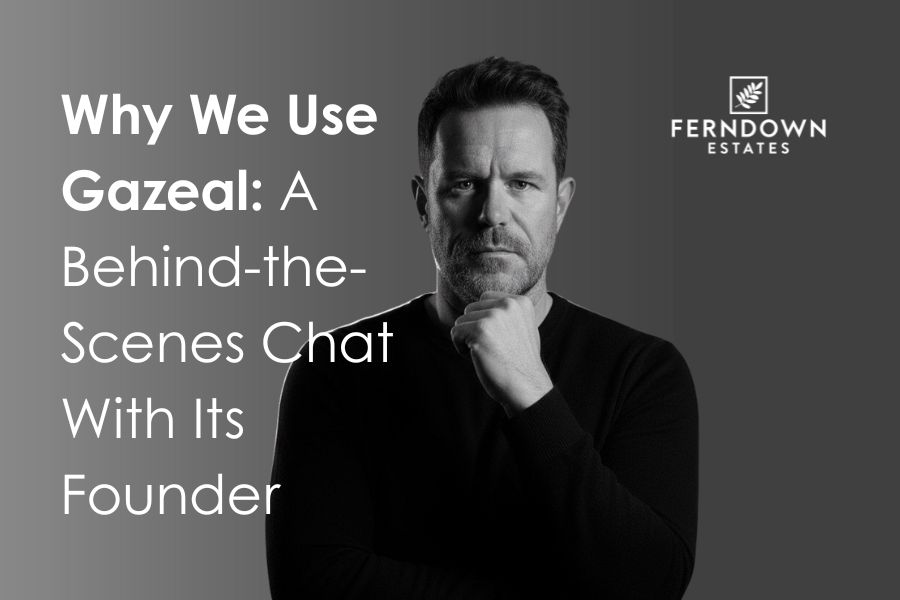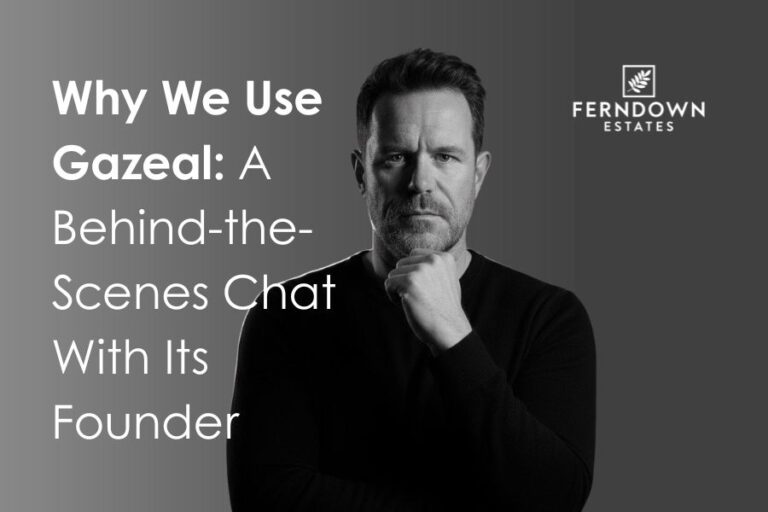Selling a home is often described as one of the most stressful processes of life. At Ferndown Estates we want to change this narrative and, while we know that its one of the most important sales you’ll ever make, try to make it as stress free as possible.
The biggest part of the stress often is surrounding the uncertainty of people. You can never guarantee peoples motivations or change of mind. Gazumping and Gazundering are rife and, unlike countries like Scotland, the process doesn’t come with any consequences until you exchange contracts. So how do you reduce that stress?
Why We Use Reservation Agreements
The simple answer is that you can’t remove the stress without something being changing the process. Traditionally, in England and Wales, a sale isn’t legally binding until exchange. That leaves a huge window where either party can walk away — sometimes weeks left in the process — with no consequences. Sellers are committing to the buyer by taking their property of market and committing to the process, but there is no way of knowing if the buyer is making the same commitment and stopping viewing other properties.
Now, as much as we would love to look at changing laws and our system being safer and fairer to our buyers and sellers, this is very unlikely to happen. That is where Gazeal steps in.
A reservation agreement is a written commitment between the buyer and seller to proceed with the transaction, subject to agreed conditions. It’s not the same as exchanging contracts, but it does offer clarity and security at an earlier stage of the sale.
We recently spoke to Bryan Mansell, co-founder of Gazeal, to understand why the platform was created, and how it helps sellers and buyers move with more certainty.
After over 35 years in the industry, Bryan saw a clear gap. While marketing and technology had evolved, the actual sales process hadn’t. And for buyers and sellers, that meant long periods of uncertainty, limited protection, and high fall-through rates.
“Every person buying or selling a home feels some level of anxiety. The question we asked was: how do we reduce that?”
— Bryan Mansell, Co-Founder, Gazeal
Gazeal: A Platform That Adds Protection and Peace of Mind
Unlike Scotland’s legal structure (where a sale becomes binding earlier through “missives”), Gazeal is designed to work alongside the current legal process in England and Wales. It doesn’t replace solicitors or change the need for formal exchange — it simply adds a much-needed layer of early commitment.
Once an offer is accepted, both buyer and seller can enter into a reservation agreement through Gazeal. This outlines the terms of the sale and confirms that both parties are committed to moving forward, subject to reasonable conditions (like finance or survey results)
This is especially helpful in protecting against two very common — and very frustrating — issues in property sales:
What is Gazumping?
Gazumping happens when a seller accepts an offer from one buyer, then later accepts a higher offer from someone else — often leaving the original buyer out of pocket for survey costs, legal fees, and time lost. There’s no legal protection for the first buyer until contracts are exchanged, which means they can be dropped without warning.
What is Gazundering?
Gazundering is the reverse. It happens when a buyer drops their offer — sometimes on the day of exchange — in the hope the seller is too far along to back out. This often forces the seller into accepting a lower price, especially if they’re in a chain or have other commitments lined up.
How Gazeal Reduces the Risk
The agreement sets clear expectations and includes built-in consequences for either party walking away unfairly. There is no upfront charge to use Gazeal. Once the offer is accepted, both parties agree to a reservation contract backed by a minimum commitment of £2,000. If the seller pulls out without reason, the buyer receives this money. If the buyer pulls out without valid grounds, the seller receives a compensation payment.
Gazeal handles these payments directly, meaning no one is left chasing money. If the withdrawing party refuses to pay, then Gazeal
pay the innocent party and
recover the cost from the defaulting party.
For sellers, it provides confidence that the buyer is serious. For buyers, it offers protection from being gazumped. And for both sides, it creates structure and accountability from the very beginning.
It also means many common issues, like renegotiations after survey or late-stage withdrawals, are handled earlier, or avoided entirely.
“If a sale is going to collapse, make sure it collapses before it starts.”
— Bryan Mansell, Co-Founder, Gazeal
Gazeal helps reduce the risk of either party backing out without good reason. And because it’s a structured agreement with clear terms, it removes the grey area that so often causes delays, renegotiations, or fall-throughs.
For sellers, it provides real peace of mind that the buyer is serious and committed.
For buyers, it helps protect against being gazumped, giving confidence that the property won’t be quietly marketed to others behind the scenes.
In short, it adds structure and fairness to a process that, without it, relies heavily on trust and goodwill alone.
How It Works at Ferndown Estates
We don’t use Gazeal in every single case, it depends on the type of sale and the circumstances of the buyer and seller. But where it’s appropriate, we offer it as a way to protect both parties and reduce unnecessary stress.The agreement is designed to work within real-world circumstances. Timescales
and the Terms can be adjusted if needed, as long as both sides agree. If a chain collapses or a delay occurs, the agreement can pause rather than cancel. And in cases where either party withdraws for genuine reasons — like serious issues being raised on surveys, title issues, or mortgage problems — no penalties apply.What are the valid reasons:
For Buyers:
-
- Mortgage Decline: If a lender formally refuses the mortgage application due to the property (must be evidenced).
-
- Down Valuation: If the property is valued lower than the offer and the seller isn’t able to renegotiate.
-
- Survey Issues: Where a survey reveals a serious defect that poses a threat to life or a significant structural issue.
-
- Legal or Title Problems: Such as an unresolvable issue with ownership, boundary disputes, or lease complications.
-
- Chain Collapse: If another sale or purchase in the buyer’s chain falls through, preventing them from proceeding.
-
- Material Misrepresentation: If the seller provides incorrect or misleading information about the property.
For Sellers:
-
- Buyer’s Chain Collapses: If their linked transaction falls through, and they cannot proceed.
-
- False or Withheld Information: If the buyer knowingly provides inaccurate details (e.g. about funding).
-
- Mutual Agreement: If both parties agree to walk away amicably.
In all cases, evidence must be provided — usually through a conveyancer or solicitor — to avoid the compensation clause being triggered.
Buyers and sellers must provide evidence through their conveyancer if withdrawing due to these types of issues, ensuring fairness throughout.
The entire system is designed to speed things up, improve transparency, and reduce the number of fall-throughs — something that currently affects over 30% of UK property transactions.It’s not legally binding in the same way as a contract to exchange, but it does hold legal weight. If either party walks away without a valid reason, they are contractually obliged to pay the agreed compensation. That alone makes most people think twice before changing their minds.
“The agreement doesn’t force anyone to exchange. It simply makes sure that if either party walks away, it’s for the right reasons.” – Bryan Mansell
Does It Actually Help?
For both parties, it sounds amazing, but does it actually work? The simple answer is yes!
According to Gazeal, property sales using their reservation agreement process:
-
- Complete on average 19 days faster
-
- Have a much lower fall-through rate
-
- Avoid many common disputes around surveys or late-stage renegotiations
As Bryan put it:
“It’s not about thinking like an estate agent — it’s about thinking like a homeowner.” – Bryan Mansell
Over the last 9 months, we’ve worked closely with our clients and the Gazeal team, and we’ve seen first-hand the difference it makes. The most consistent feedback we get is about thepeace of mind it brings.
We’re still learning, and every sale is different, but one thing is clear: it works. And when buyers and sellers are given better structure and clearer expectations, everything tends to move more smoothly.
It’s Not a Gimmick — It’s a Practical Tool
This isn’t about adding more paperwork or creating barriers. It’s about building trust and helping you sell your home with more certainty.
If you’re serious about selling or buying and want the other party to be equally committed, then using Gazeal might be one of the simplest ways to reduce risk and move forward with confidence.
We’ll always talk you through the options and explain where it fits into your sales journey.







